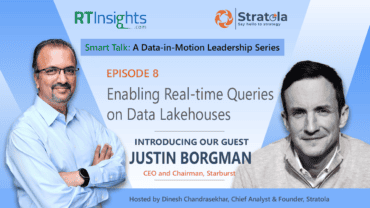
In this week’s real-time analytics news: NVIDIA and Google Cloud collaborate to make it easier to develop AI-powered apps.
Keeping pace with news and developments in the real-time analytics and AI market can be a daunting task. Fortunately, we have you covered with a summary of the items our staff comes across each week. And if you prefer it in your inbox, sign up here!
NVIDIA and Google Cloud announced three new collaborations to make it easier for developers to create AI-powered applications with world-class performance.
Gemma + NIM: Using TensorRT-LLM, NVIDIA is working with Google to optimize two new models: Gemma 2 and PaliGemma. These models are built from the same research and technology used to create the Gemini models, and each is focused on a specific area:
- Gemma 2 is the next generation of Gemma models for a broad range of use cases and features a new architecture designed for improved performance and efficiency.
- PaliGemma is an open vision language model (VLM) inspired by PaLI-3. PaliGemma is designed for a wide range of vision-language tasks and is also supported by NVIDIA JAX-Toolbox.
Gemma 2 and PaliGemma will be offered with NVIDIA NIM inference microservices, part of the NVIDIA AI Enterprise software platform. NIM support for the two new models is available from the API catalog, starting with PaliGemma today; they will soon be released as containers on NVIDIA NGC and GitHub.
Bringing Accelerated Data Analytics to Colab
Google also announced that RAPIDS cuDF, an open-source GPU dataframe library, is now supported by default on Google Colab. With RAPIDS cuDF, developers using Google Colab can speed up exploratory analysis and production data pipelines.
Taking AI on the Road
By employing AI PCs using NVIDIA RTX graphics, Google and NVIDIA also announced a Firebase Genkit collaboration that enables app developers to easily integrate generative AI models, like the new family of Gemma models, into their web and mobile applications. Developers can start work streams using local RTX GPUs before moving their work seamlessly to Google Cloud infrastructure.
Kyndryl unveiled a new artificial intelligence (AI) and generative AI-based consulting and managed delivery services to help organizations exploit their mainframe application and data assets as part of their hybrid cloud transformation. In particular, Kyndryl is tapping into AI and generative AI tooling, as well as the operational insights from its AI-infused Kyndryl Bridge open integration platform to help mainframe customers explore, kick-start, or scale the deployment of responsible AI.
The expanded AI capabilities for the mainframe are supported by Kyndryl Consult and complement the company’s AI and data advisory and implementation services, which include assessments, innovation workshops, and proofs of concept.
The Linux Foundation announced the launch of the High Performance Software Foundation (HPSF). Through a series of technical projects, HPSF aims to build, promote, and advance a portable core software stack for high performance computing (HPC) and AI. The HPSF is launching with the following initial open-source technical projects:
- Spack: the HPC package manager.
- Kokkos: a performance-portable programming model for writing modern C++ applications in a hardware-agnostic way.
- Viskores (formerly VTK-m): a toolkit of scientific visualization algorithms for accelerator architectures.
- HPCToolkit: performance measurement and analysis tools for computers ranging from desktop systems to GPU-accelerated supercomputers.
- Apptainer: Formerly known as Singularity, Apptainer is a Linux Foundation project providing a high performance, full featured HPC and computing optimized container subsystem.
- E4S: a curated, hardened distribution of scientific software packages.
Other real-time analytics news in brief
Aerospike released version 7.1 of its real-time multi-model database, which expands and adds new best-in-class caching, storage, and management capabilities and offers customers the option to deploy real-time use cases on less expensive network-attached storage in the cloud or on-prem. Version 7.1 enables enterprise customers to run hundreds of caches on a relatively small Aerospike cluster as a shared service, thereby cutting costs. Additionally, Version 7.1 delivers precise policy-driven control of which data is cached using a configurable least recently used (LRU) eviction, enabling teams to stand up Aerospike as a shared in-memory cache service.
Alation announced the launch of Alation Workflow Automation to help data stewards meet the increasingly complex data governance needs of enterprise data environments. The solution leverages Alation Automation Bots and extends existing platform workflow automation capabilities to automate manual and repetitive tasks. The bots increase metadata quality by proactively checking for missing security classifications, titles, and terms and prompting data stewards to act. These rulesets and workflows can be further customized to reflect organizations’ unique needs.
Alteryx announced Alteryx AiDIN Copilot, an AI assistant designed to empower users to seamlessly build analytical workflows for improved revenue and business efficiency. Alteryx AiDIN Copilot will leverage Google Cloud’s Gemini AI models to give customers a conversational interface to interact with data. The new Alteryx AiDIN Copilot is designed to enable new and experienced data workers to solve business problems even faster, help all employees, regardless of technical acumen, make data-driven decisions using AI, and help IT use AI in a governed and trusted environment.
Anomalo announced that it has expanded its partnership with Google Cloud and made its platform available on Google Cloud Marketplace so users can quickly purchase Anomalo using their committed Google Cloud spend. Anomalo provides organizations with a way to monitor the quality of the data stored or managed in Google Cloud’s BigQuery, AlloyDB and Dataplex without writing code, configuring rules or setting thresholds. Additionally, Anomalo monitors data in BigQuery and AlloyDB and integrates with Dataplex to help enterprises resolve data quality issues faster.
Amazon Web Services (AWS) announced its plans to invest €7.8 billion in the AWS European Sovereign Cloud in Germany through 2040, which reflects AWS’s long-term commitment to meeting Europe’s digital sovereignty needs. The AWS European Sovereign Cloud is planning to launch its first AWS Region in the State of Brandenburg, Germany, by the end of 2025, available to all customers.
Amperity announced a new composable approach for customer data management: the Lakehouse CDP. Now, brands can seamlessly share live data sets between a CDP and a lakehouse without maintaining ETLs or copying data. IT teams can optimize how data is stored and processed with any platform that uses lakehouses’ open table formats to save time and lower costs. This composable and more secure flow of data ensures brands can fuel the data-intensive demands of Generative AI and 1:1 personalization with high-quality data.
Camunda announced the addition of key capabilities focused on bringing even more AI value to its end-to-end process orchestration platform. With the new capabilities, organizations can implement AI in any process, making automation more intelligent with very little implementation effort. Furthermore, with a built-in copilot and other AI-assisted capabilities, enterprises can more efficiently move from local implementations to a holistic automation strategy, supercharging efficiency, productivity, and continuous improvement across the organization.
Cirata announced that Cirata Data Migrator is now available on Google Cloud Marketplace. The availability of the Cirata high-volume data migration technology on Google Cloud makes it easier for joint customers to acquire the technology they need to migrate Hadoop data lakes across multi-cloud environments that include Google Cloud while helping to optimize cloud spend. Cirata Data Migrator is a fully automated solution that moves on-premises HDFS data, Hive metadata, local filesystem, or cloud data sources to any cloud or on-premises environment, even while those datasets are under active change.
ClearML announced the release of new AI orchestration and compute management capabilities. The solution now supports Kubernetes, Slurm, PBS, and bare metal for seamless orchestration of AI and machine learning workloads. The inclusion of Slurm and PBS, popular open-source workload managers commonly utilized in high-performance computing (HPC) environments, enhances ClearML’s offerings, which supports all popular Kubernetes variants as well as bare metal.
Cube announced new intelligent capabilities to accelerate the development of AI and embedded analytics solutions. These include AI API, now in preview, and chart prototyping for Cube Cloud. With Cube’s new native AI API, customers no longer need to build complex integrations between LLMs and Cube Cloud, simplifying and accelerating the development of AI Agents and chatbots. The AI API is now available in preview and will be generally available this fall. With chart prototyping in Cube Cloud, users can generate front-end TypeScript code from Playground 2.0 for faster time-to-market.
DataStax announced the upcoming launch of DataStax HCDP (Hyper-Converged Data Platform), in addition to the upcoming release of DataStax Enterprise (DSE) 6.9. Both products enable customers to add generative AI and vector search capabilities to their self-managed enterprise data workloads. DataStax HCDP is designed for modern data centers and Hyper-Converged Infrastructure (HCI) to support the breadth of data workloads and AI systems. DataStax Enterprise 6.9 offers enterprise operators and architects with massive on-premises Cassandra and DSE workloads a fast upgrade to lower the total cost of ownership and operational overhead while adding powerful GenAI capabilities to their existing on-premises data.
dbt Labs announced dbt Cloud enhancements designed to help businesses turn data into a competitive advantage. New dbt Cloud features include dbt Assist, an AI-powered copilot experience; advanced CI, which provides a “compare changes” view to let teams verify that changes to the codebase meet quality expectations before they are merged into production; and more. Additionally, new platform enhancements and integrations give dbt Cloud even more context into the dashboards and decisions that dbt models power. For instance, dbt Cloud now supports Microsoft Azure Synapse (preview) and Microsoft Fabric (generally available).
Flatfile announced significant enhancements to its Data Exchange Platform. The Spring 2024 release features new AI-powered data transformation and data migration capabilities for business users, data analysts, and systems integration teams, as well as improved tooling and extensions for data exchange solution developers. As such, the Flatfile Data Exchange Platform provides software development teams with an efficient and easy way to build exactly the data collection, transformation, and migration solution their users need.
Genesys announced new AI capabilities to transform every customer and employee experience. With Agent Copilot, Virtual Agent, Empathy Detection, and Modern Agent Workspace for the Genesys Cloud platform, Genesys is empowering organizations to move to a next era of customer experiences grounded in a strong AI-human partnership. The Genesys Cloud AI innovations improve customer loyalty by elevating self-service and assisted service experiences, boosting employee performance and productivity, and giving managers dynamic new insights and tools to lead.
IBM announced the general availability of IBM Rapid Network Automation—the first solution that stems from its Pliant acquisition in March. IBM Rapid Network Automation is an advanced API-driven tool that is designed to automate, integrate, and connect infrastructure across a hybrid cloud environment. Using a low-code approach and transforming API code into deployment-ready action blocks, IBM Rapid Network Automation is equipped with thousands of out-of-the-box integrations that help facilitate, integrate, and secure communication up and down the technology stack between platforms, services, and applications.
MetaRouter announced the launch of ACCELERATE, a pre-packaged solution designed to simplify and expedite the transition to server-side data collection. MetaRouter’s ACCELERATE program streamlines implementation timelines while reducing technical debt and data privacy risks. It is purpose-built for organizations seeking higher signal density from their web properties, SIs looking to round out their digital data solution design, or technology companies needing resilient event collection to feed their product offerings.
Rockset announced native support for hybrid search. Hybrid search involves incorporating vector search and text search as well as metadata filtering, all in a single query. Users can now leverage hybrid search to combine vector, text, geospatial, and structured search to retrieve and rank the most relevant results. Additionally, the capabilities allow organizations to accelerate the pace of building and iterating on AI applications with vector databases that rapidly adapts indexing, models, and ranking.
ScaleOut Software introduced Version 3 of its ScaleOut Digital Twins cloud service and on-premises hosting platform. The latest release introduces a user interface designed to streamline the deployment and management of digital twins. It also adds advanced capabilities for constructing large-scale simulations using digital twins and establishing connections with a wider array of messaging sources. Notably, Version 3 seamlessly integrates with Amazon Dynamo DB, offering enhanced persistence capabilities. Additionally, with ScaleOut Digital Twins, Version 3 users can connect digital twin models to open-source Kafka running on-premises or Azure Kafka running in the cloud. Digital twins can now be persisted to AWS Dynamo DB in addition to SQL Server and Azure Digital Twins.
SensiML, a subsidiary of QuickLogic, announced a complete, open-source AutoML solution for the development of edge AI/ML applications with its popular Analytics Studio application. The open-source model already prevails for highly-adopted AI libraries such as TensorFlow and PyTorch, but until now, it has not offered comprehensive AutoML development tools for IoT edge devices. SensiML’s open-source offering delivers enhanced creativity, innovation, and AI code transparency to the global community of IoT device developers.
SolarWinds announced enhancements to its SolarWinds Database Performance Analyzer (DPA). The enhancements provide enterprises with greater visibility and control over databases across on-prem and cloud environments. Specifically, the updated SolarWinds Database Performance Analyzer (version 2024.2) now provides expanded support for PostgreSQL. To that end, SolarWinds has introduced a new Tuning Advisors feature, which improves PostgreSQL database clusters by examining queries, tables, and indexes to deliver actionable insights for optimizing database performance and minimizing bottlenecks.
StreamNative launched Ursa, a Kafka-compatible data streaming engine built on top of lakehouse storage. Ursa is advancing Apache Pulsar with added functionality in public and private cloud environments to take data streaming to its next generation. Ursa leverages Apache Pulsar’s architectural principles and benefits and offers three significant updates: Kafka API compatibility, a departure from ZooKeeper and BookKeeper (enabling easier deployments in modern containerized environments, such as Kubernetes), and a Lakehouse first approach.
If your company has real-time analytics news, send your announcements to ssalamone@rtinsights.com.
In case you missed it, here are our most recent previous weekly real-time analytics news roundups:
- Real-time Analytics News for the Week Ending May 11
- Real-time Analytics News for the Week Ending May 4
- Real-time Analytics News for the Week Ending April 27
- Real-time Analytics News for the Week Ending April 20
- Real-time Analytics News for the Week Ending April 13
- Real-time Analytics News for the Week Ending April 6
- Real-time Analytics News for the Week Ending March 30
- Real-time Analytics News for the Week Ending March 23
- Real-time Analytics News for the Week Ending March 16




























